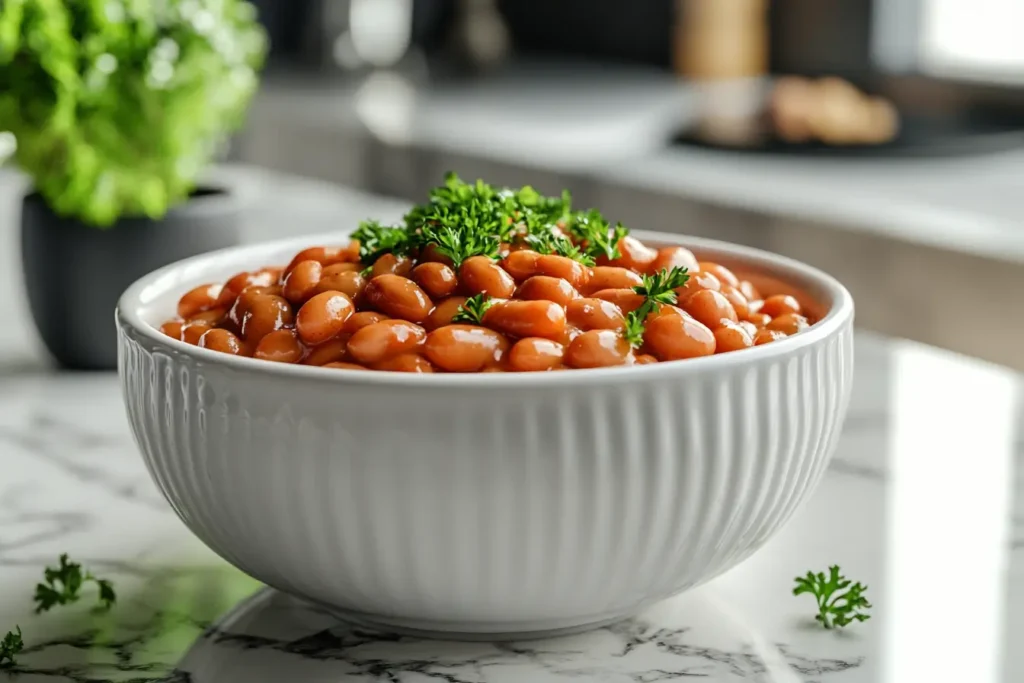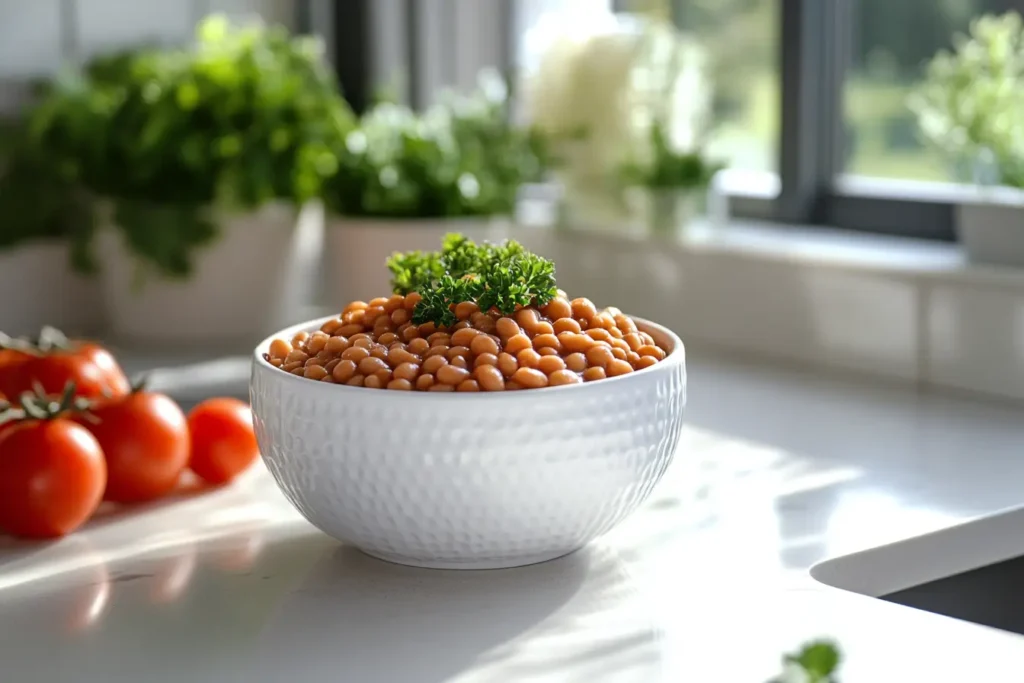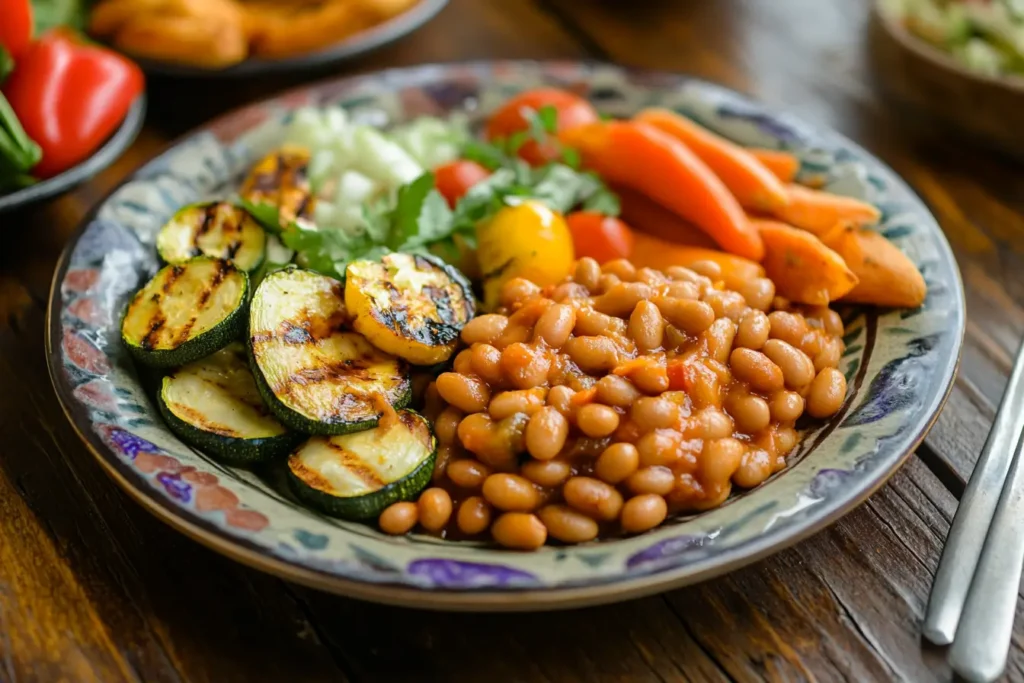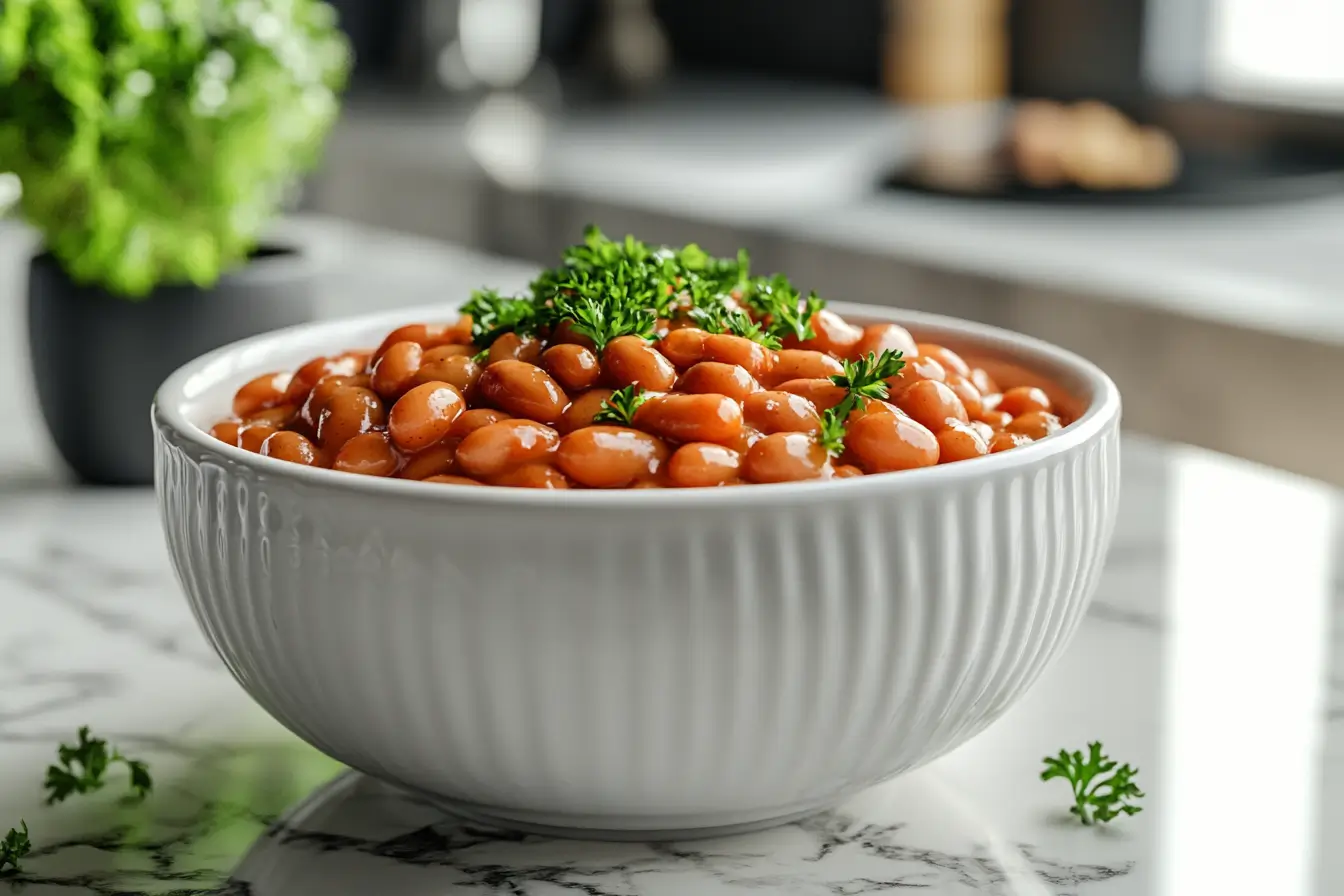
Baked beans are one of those comfort foods we all know and love. Whether they’re slathered on toast, served alongside a barbecue, or added to a hearty casserole, they’re a staple in many kitchens worldwide. But the big question is: Are baked beans actually healthy to eat? Let’s break it down and see what makes this humble food tick.
Introduction: The Popularity of Baked Beans
Baked beans have a special place in our hearts (and bellies). They’re quick, convenient, and versatile, making them a go-to for busy weeknights or lazy weekends. And let’s not forget their nostalgic charm—many of us grew up eating them with breakfast or at family picnics.
But behind the comforting taste lies a debate: Are they a nutritious choice or just a sugar-laden indulgence? Let’s dig into the details to find out.
Nutritional Profile of Baked Beans

To understand whether baked beans are healthy, we need to start with what’s inside them. Spoiler alert: There’s more to these beans than meets the eye!
Calories and Macronutrients
When it comes to calories, baked beans are pretty moderate. A typical half-cup serving contains about 120–150 calories, depending on the brand or recipe. They’re also a decent source of protein and carbohydrates, which provide the energy your body needs to function.
However, fats are minimal, which is good news if you’re keeping an eye on your intake. The protein content, especially, makes them a satisfying choice for those looking to stay full longer.
“Baked beans are a protein-packed powerhouse for vegetarians, providing around 6–7 grams of protein per serving.”
Vitamins and Minerals in Baked Beans
Did you know baked beans are also a mini treasure chest of nutrients? They’re rich in iron, which helps your blood transport oxygen, and magnesium, a mineral that supports muscle and nerve function. You’ll also find zinc, essential for immune health, and B vitamins, like folate, which is vital for cell repair and growth.
It’s like your multivitamin came in bean form!
Fiber Content and Its Health Benefits
One of the standout features of baked beans is their high fiber content. Fiber not only helps keep your digestive system running smoothly, but it can also help lower cholesterol levels and keep you feeling full for longer.
For context, that same half-cup serving packs around 4–6 grams of fiber. That’s a solid chunk of your daily recommended intake, especially if you’re looking to maintain a healthy gut.
Health Benefits of Baked Beans
So now that we know what’s inside, let’s talk about what baked beans can do for you. Spoiler alert: They’re more than just a tasty treat.
Supporting Heart Health
Baked beans are heart heroes in disguise! Thanks to their soluble fiber, they can help reduce LDL cholesterol (that’s the bad kind) and improve overall heart health. Add to that their low-fat profile, and you’ve got a food that loves your heart as much as you do.
Enhancing Digestive Health
If you’ve ever heard the phrase, “Beans, beans, the magical fruit,” you’ll know they’re famous for their effects on digestion. That fiber content we mentioned earlier? It acts like a broom for your intestines, sweeping out waste and keeping things moving smoothly.
But, of course, this can sometimes lead to…well, extra gas. Don’t worry, we’ll tackle that issue later!
Aiding Weight Management
Looking to shed a few pounds or maintain your current weight? Baked beans might be your new best friend. Their combination of protein and fiber helps curb hunger and keeps you feeling full longer. Plus, they’re relatively low in calories, so you can enjoy them without guilt.
“Eating foods that are high in protein and fiber can help you feel satisfied, making it easier to stick to a healthy eating plan.”
Common Concerns About Baked Beans
Alright, time for some real talk. Baked beans are great, but they’re not perfect. Let’s address the elephant in the room—or should we say the bean in the can?
Are Baked Beans High in Sugar?
One of the biggest knocks against baked beans is their sugar content. Many canned varieties include added sugars to enhance their flavor. In fact, a single serving can contain 5–12 grams of sugar, depending on the brand.
While this isn’t a dealbreaker, it’s something to watch if you’re monitoring your sugar intake. Opting for low-sugar versions or making your own at home can be great alternatives.
Sodium Levels in Canned Baked Beans
Salt is another area where baked beans can be a bit sneaky. Canned varieties often contain high levels of sodium—sometimes up to 600 mg per serving. That’s about a quarter of the recommended daily limit for most adults.
If you’re trying to reduce your salt intake, look for low-sodium options or rinse your beans before cooking to cut down on excess sodium.
Additives and Preservatives: Are They Harmful?
Lastly, some canned baked beans include preservatives and additives to prolong shelf life or enhance flavor. While these are generally considered safe in small amounts, they can be off-putting for those looking to eat clean.
The solution? Make your baked beans at home! It’s easier than you think and gives you full control over what goes into them.
Comparing Homemade vs. Canned Baked Beans
When it comes to baked beans, you’ve got two main options: homemade or canned. Both have their pros and cons, so let’s see how they stack up.
Nutritional Differences
Homemade baked beans often have fewer additives and less sugar compared to their canned counterparts. Plus, you can tweak the recipe to suit your taste buds and dietary needs. Canned beans, on the other hand, are convenient and ready to eat in minutes.
Pros and Cons of Homemade Baked Beans
Homemade baked beans are a labor of love. They take time to prepare, but the payoff is worth it. You can choose wholesome ingredients, experiment with flavors, and avoid any unwanted preservatives.
The downside? They’re not exactly quick. If you’re short on time, they might not be the most practical option.
Are Canned Baked Beans Convenient but Less Healthy?
Canned baked beans are a lifesaver for busy days. They’re affordable, easy to store, and don’t require much effort. However, the trade-off can be higher sugar and sodium levels, as well as fewer customization options.
Are Baked Beans Suitable for All Diets?
One of the coolest things about baked beans is their versatility. They can fit into a wide range of dietary preferences and restrictions, making them a crowd-pleaser for everyone. But are they really suitable for all diets? Let’s take a closer look.
Baked Beans for Vegetarians and Vegans
Good news for vegetarians and vegans: baked beans are a plant-based protein superstar! Made from navy beans, they provide essential nutrients like protein, iron, and zinc without any animal products.
However, if you’re vegan, check the label carefully. Some recipes might include animal-based ingredients, like pork fat or bacon, especially in canned varieties. Want to play it safe? Whip up a homemade version that’s 100% vegan-friendly.
Gluten-Free and Allergy-Friendly Options
Baked beans are naturally gluten-free, but cross-contamination or added ingredients could be an issue for those with celiac disease or gluten sensitivities. Always double-check the packaging for a “certified gluten-free” label.
As for other allergies, baked beans are generally safe. Still, it’s worth skimming the ingredient list if you have food sensitivities or are serving them to someone who does.
Low-Sodium and Low-Sugar Alternatives
If you’re managing conditions like high blood pressure or diabetes, the typical canned baked beans might not be the best fit. But don’t worry—there are plenty of low-sodium and low-sugar options on the market.
Better yet, make your own baked beans and control the salt and sweeteners. Swap out sugar for natural alternatives like honey or maple syrup and use herbs and spices to amp up the flavor.
Popular Recipes Featuring Baked Beans

Baked beans are a kitchen chameleon—they can take on so many roles, from star of the show to supporting sidekick. Ready to try something new? Here are some recipe ideas to inspire your next meal.
Classic Baked Beans
Let’s start with the basics. Classic baked beans are simmered with a tangy, sweet sauce made from tomato paste, molasses, and spices. It’s the ultimate comfort food and pairs perfectly with grilled meats, cornbread, or even eggs at breakfast.
Want to elevate the classic? Add a pinch of smoked paprika or a dash of apple cider vinegar for a flavor twist.
Healthy Variations of Baked Beans
If you’re looking for a lighter version, you can make baked beans without all the sugar and salt. Use fresh tomatoes, garlic, and onion as a base for the sauce and let the natural sweetness of the beans shine through.
For an extra health kick, toss in some chopped veggies like carrots, bell peppers, or spinach. It’s a great way to sneak in more nutrients without sacrificing flavor.
“Healthy eating doesn’t have to mean boring food—just look at baked beans!” 🌟
Creative Ways to Include Baked Beans in Your Diet
Baked beans don’t have to be relegated to a side dish. Here are some creative ways to incorporate them into your meals:
- Baked Bean Chili: Replace half the meat in your chili recipe with baked beans for a fiber boost.
- Bean Tacos: Use baked beans as a filling for tacos or burritos for a sweet and savory twist.
- Bean and Veggie Stir-Fry: Add baked beans to your favorite stir-fry recipe for a hearty, satisfying meal.
The possibilities are endless—think of baked beans as your culinary canvas! 🎨
Tips for Choosing Healthy Baked Beans
Whether you’re shopping at the grocery store or making them from scratch, there are a few tips to keep in mind to ensure you’re getting the healthiest version of baked beans possible.
Reading Nutrition Labels
When buying canned baked beans, don’t just grab the first can you see. Take a moment to read the nutrition label. Look for options with:
- Lower sugar content: Aim for less than 6 grams of sugar per serving.
- Low sodium: Stick to products with less than 140 mg of sodium per serving if possible.
- No unnecessary additives: Simpler ingredient lists are usually better.
Best Brands for Healthy Baked Beans
Some brands are stepping up their game when it comes to healthy options. Look for well-known names like:
- Amy’s Organic Baked Beans (low in sugar and made with organic ingredients)
- Eden Foods (known for its BPA-free cans and clean ingredients)
- Heinz No Added Sugar Beans (a classic brand with a healthier twist)
Preparing Baked Beans at Home
Homemade baked beans are the gold standard for health and flavor. Here’s a quick guide:
- Start with dried or canned beans. Navy beans or white beans work best.
- Make your sauce. Combine tomato paste, mustard, vinegar, and a touch of natural sweetener like maple syrup or honey.
- Simmer and enjoy. Let the beans cook in the sauce on low heat until the flavors meld together.
Not only do you get total control over the ingredients, but homemade baked beans also make your kitchen smell amazing!
Common Myths About Baked Beans
Let’s bust some myths about baked beans, shall we?
Myth: All Canned Foods Are Unhealthy
Sure, some canned foods get a bad rap, but baked beans can be a nutritious exception. Many brands now offer healthier options with reduced sugar and sodium. Plus, the canning process actually preserves nutrients, so you’re not missing out.
Myth: Baked Beans Are Only for Breakfast
Who says baked beans are just for breakfast? They’re an all-day kind of food! Try them in a hearty stew for dinner, or use them as a topping for loaded baked potatoes at lunch. They’re as versatile as your favorite pair of jeans. 👖
Myth: Baked Beans Cause Major Gas Issues
Ah, the infamous gas issue. While it’s true that beans can cause bloating for some people, soaking dried beans or rinsing canned ones can help. Plus, your digestive system adapts over time, so don’t let this myth scare you off.
FAQs About Baked Beans
Let’s address some common questions that people often have about baked beans.
Are baked beans good for breakfast?
Absolutely! Baked beans are a classic breakfast staple, especially when paired with eggs or toast. Their combination of fiber and protein gives you a hearty start to the day. Curious about other breakfast options? Check out this list of breakfast casserole recipes for more ideas.
Can I add baked beans to other dishes?
Yes, baked beans are incredibly versatile! You can include them in casseroles, stews, or even salads. They pair wonderfully with dishes like this perfect cornbread recipe for a comforting meal.
Are there easy ways to make baked beans at home?
Making baked beans at home is simpler than you think. With a few basic ingredients, you can create a flavorful dish that beats store-bought options. For inspiration, check out these baked bean recipes to get started.
Conclusion: Are Baked Beans Worth It?
So, are baked beans healthy to eat? The answer is a resounding yes—but with some caveats. They’re packed with nutrients like protein, fiber, and vitamins, making them a great addition to most diets. However, be mindful of store-bought varieties that are high in sugar or sodium.
When enjoyed in moderation and paired with other wholesome foods, baked beans can be a delicious and nutritious choice. Whether you’re savoring them at breakfast, mixing them into recipes, or preparing them from scratch, baked beans truly deserve a spot on your plate. 😊
By exploring all the options, like the baked bean recipes or pairing them with dishes like southern cornbread, you can make the most of this classic comfort food.

